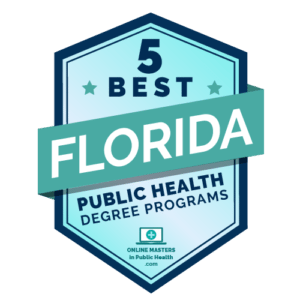 As the US healthcare industry expands every year, now is a great time to enter the field with a degree in Public Health. Studying for the degree online provides a tremendous amount of flexibility, and allows prospective students to find a timeline to a degree that works best for their life. Florida, with its large population of elderly people, frequent powerful storms, and massive wealth disparity is a great place to both study and work in public health. Pay special attention to any programs that feature an environmental element, as that will certainly prove fruitful if you choose to work in Florida after graduating one of these programs. Florida is one of the states that refused to accept additional funding for Medicaid through the Affordable Care Act, despite an estimated 2.7 million Floridians depending on Medicaid as of 2009. Medicaid paid for 60% of the births in Florida in that same year. Florida is second only to Texas in its number of uninsured residents.
As the US healthcare industry expands every year, now is a great time to enter the field with a degree in Public Health. Studying for the degree online provides a tremendous amount of flexibility, and allows prospective students to find a timeline to a degree that works best for their life. Florida, with its large population of elderly people, frequent powerful storms, and massive wealth disparity is a great place to both study and work in public health. Pay special attention to any programs that feature an environmental element, as that will certainly prove fruitful if you choose to work in Florida after graduating one of these programs. Florida is one of the states that refused to accept additional funding for Medicaid through the Affordable Care Act, despite an estimated 2.7 million Floridians depending on Medicaid as of 2009. Medicaid paid for 60% of the births in Florida in that same year. Florida is second only to Texas in its number of uninsured residents.
Methodology
In order to complete the ranking for The 5 Best Public Health Degree Programs in Florida, we inspected the range of public health degree programs offered throughout the state. The public health programs may be completed online, partially online, or on-campus. We then followed a standard methodology that can be found below.

1) University of Florida
UF is a senior member of the State University System of Florida. It was founded in 1853, and operates from Gainesville, Florida. Over 52,300 students attend the school, which offers a 20:1 student-to-faculty ratio. It’s a public, sea-grant, space-grant, and land-grant research school with an immaculate reputation. Some of the degree topics they’re known for include: environmental management in agriculture and natural resources, health education, biology, entomology, industrial and systems engineering, and Latin. Students also can take doctoral degrees in education, audiology, philosophy, classical studies, nursing practice, and pharmacy. The University of Florida is consistently ranked as one of the top-value schools in the country by sources like Princeton Review and Smart Money Magazine. In 2018 it was ranked the ninth best public university in the country by USNR. The University of Florida’s athletic teams are called the Florida Gators and compete in National Collegiate Athletic Association (NCAA) Division I in the Southeastern Conference (SEC). They offer nine men’s sports and twelve women’s sports. Notable alumni include senator Marco Rubio, sportscaster Erin Andrews, NFL running back Emmitt Smith, and talking head Joe Scarborough.
UF offers Bachelor’s, Master’s and Doctoral degrees in Public Health. The Bachelor’s degree requires 120 credit hours, and gives students the skills they need to begin careers in community or individual health care. For students who aren’t in a rush to get their degree and have significant existing obligations, its MPH program allows its students up to 7 years to work through the required 48 credit hours, and includes concentrations in Social and Behavioral Sciences, Epidemiology, Biostatistics, Environmental Health, Public Health Policy & Management, and Public Health Practice. It also has diverse Doctoral offerings, including PhD’s in Public Health with tracks in Social and Behavioral Science and Public Health One Health (research in public health, veterinary health and environmental health). Some of these degrees and tracks are offered online and on campus, but make sure to check the current delivery options of the degree you’re looking for. Tuition also depends on the program.
University of Florida Homepage
2) Florida State University
Florida State is a premier public school for sea-grant and space-grant research (Florida is a magnet for those fields). It was founded in 1851, and operates out of Tallahassee. The school is comprised of 16 colleges and over 360 programs of study that convey degree levels ranging from Associates through Doctorates. It’s known for its programs in law, business engineering, medicine, social policy, film, music, theater, dance, visual art, political science, psychology, social work, and more. In 2017 USNR ranked Florida State as the 33rd best public university in the United States. Over 41,000 students attend FSU, which has a 24:1 student-to-faculty ratio. FSU’s athletic teams are called the Seminoles, and compete in NCAA Division 1 in the Atlantic Coast Conference in 8 men’s sports and 9 women’s. Notable FSU alumni include the NFL’s Deion Sanders and Jameis Winston, as well as actor Burt Reynolds and actress Cheryl Hines.
FSU offers a Master’s in Public Health program. It grapples with the strengths and weaknesses of the American health system, giving graduates a degree that will help them impact it. Students will build leadership skills in the anticipation, prevention, measurement, management, and response to disease. They will also learn techniques to assess and improve health care programs and policies in America and globally. Graduates work in state health departments, consulting firms, the federal government, managed care firms or lobbying and advocacy groups. This program includes a 200 hour internship, which may be paid. FSU also offers a joint BS/MPH program in which students earn 12 hours of graduate credits that go towards both their Bachelor’s and Master’s degrees. In 2017-18, the average in-state tuition for FSU graduate students was $9,684, and $24,116 for out-of-state students. Students had $1,869 in fees regardless of their residence.
Florida State University Homepage
3) University of South Florida
USF is a public research university headquartered in Tampa, Florida. It’s a member of the Florida state system, and was founded in 1956. It conveys 80 undergraduate majors and more than 130 graduate, specialist, and doctoral-level degree programs through 14 colleges. USNR’s 2018 edition ranked USF 68th of Top Public Schools and 140th in National Universities. It’s especially known for its graduate programs in Public Health, Library and Information Studies, Education, and Criminology, which all rank in the top 5 in USNR’s graduate school rankings. Over 42,800 students attend USF, which offers a 22:1 student-to-faculty ratio. The South Florida Bulls compete in NCAA Division 1 in the American Athletic Conference. They offer men and women 17 varsity sports. Notable alumni include comedian Assif Mandvi, MLB’s Tony LaRussa, actress Kissy Simmons, and Hulk Hogan himself.
USF offers public health degrees at the Master’s and Doctorate levels. They have one of the few online delivery formats for both as well. MPH concentrations include Epidemiology, Public Health Practice, Global Disaster Management, Humanitarian Relief & Homeland Security, Infection Control, Social Marketing, Nutrition and Dietics, and Health, Safety & Environment. These programs feature internships, field positions, community engagement and more, with local and global opportunities. USF’s public health approach melds research and multiple disciplines to solve problems that stand between the universal right to health. In 2017-18, average graduate tuition at USF was $8,350 for Florida residents, and $19,048 for those out-of-state. Both paid fees of $2,078.
University of South Florida Homepage
4) Florida International University
FIU is a public research university based in Miami. It was founded in 1965. The school serves just over 55,000 students and has a 27:1 student-to-faculty ratio. FIU’s large catalog boasts 191 programs of study with more than 280 majors in 23 colleges and schools. Florida International University was named the #7 college in the United States by the Social Mobility Index college rankings in 2015. In 2010, FIU was listed as one of 16 universities with the toughest grading system nationally. U.S. News & World Report found that FIU students are among the least indebted college students in the nation, and called it a “best buy” in higher education. It also has a unique honors program for online students. FIU’s Panthers compete in 17 varsity sports in the NCAA Division I as part of Conference USA. Notable alumni include actor Andy Garcia, the WNBA’s Andrea Nagy, judge Ian Richards and television’s Elizabeth Perez.
FIU offers an MPH in concentrations of Biostatistics, Environmental Health Sciences, Epidemiology, Health Policy and Management, Health Promotion and Disease Prevention. The program was designed for both full and part-time students. It has a fully online component, and an accelerated MPH that can be completed in a year. It features strong community partnerships that yield experiential learning opportunities. The program also is based in research that responds to hot button issues on the public health scene today, including maternal and child health. Students will have access to world class professors and laboratories. In 2017-18, the average graduate tuition at FIU was $8,912 for in-state students and $21,393 for those out-of-state, with both groups paying $2,185 in related fees.
Florida International University Homepage
5) University of Miami
The University of Miami is a private, research university in Coral Gables. It was founded in 1925. Over 16,700 students attend the school, which has a 12:1 student-to-faculty ratio. In the 2017 U.S. News and World Report study of colleges and universities, UM was ranked the 44th best national university in the country. Its athletic teams, the Miami Hurricanes, compete in Division I of the National Collegiate Athletic Association in 7 men’s varsity sports and 10 women’s. Its notable alumni include physicists Paul Dirac and Carolyne M. Van Vliet, legal expert Paul R. Verkuil, bassist Jaco Pastorius, guitarist Pat Metheny, artist Walter Darby Bannard, and philosopher Colin McGinn. UM offers 116 undergraduate, 105 master’s, and 63 doctoral degree programs (59 are research/scholarship based), in addition to four professional areas of study.
UM offers several public health programs at the graduate at doctoral level. These include an MPH, a MSPH (Master of Science), an MS and PhD in Biostatistics, a PhD in Epidemiology, and a PhD in Prevention Science and Community Health. An accelerated format for the MPH is available as well. These programs help students grasp and master fundamental public health disciplines. They also prepare graduates for research or technical careers in government, industry, academia, or private institutions. Make sure to carefully inspect each program for its delivery method, cost, and whatever other factors are most important to you.